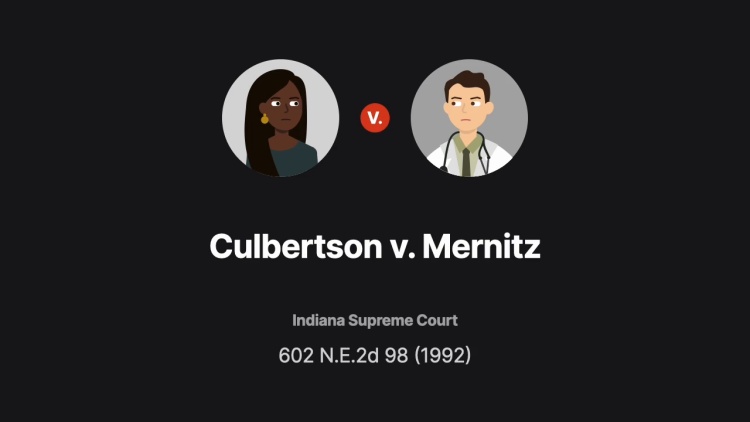Culbertson v. Mernitz
Indiana Supreme Court
602 N.E.2d 98 (1992)
- Written by Angela Patrick, JD
Facts
Patty Jo Culbertson (plaintiff) saw Dr. Roland Mernitz (defendant) for bladder and vaginal issues. Mernitz recommended that Culbertson have a combination of surgeries to correct the problems. Although Mernitz told Culbertson about several risks with this treatment course, he did not tell her there was a risk her cervix might become fused to her vaginal wall. Culbertson agreed to the procedures, but her cervix ended up fused to her vaginal wall. Correcting this accidental fusion required additional surgeries and the loss of several parts of Culbertson’s reproductive system. Culbertson filed a complaint with the state, claiming that Mernitz had not told her enough about the specific risk of an accidental fusion. A medical review board determined that a fused cervix was not generally considered a risk of these procedures. Therefore, the board concluded that a reasonably prudent doctor would not have disclosed fusion as a risk and that Mernitz had met the standard of care for obtaining informed consent. Culbertson then sued Mernitz in court. Mernitz moved for summary judgment, relying on the review board’s finding to prove he had met the standard of care: what a reasonably prudent doctor would disclose. Culbertson did not provide any expert testimony to counter this finding. Instead, Culbertson argued that the correct standard of care should be what a reasonably prudent patient would want to know. The trial court granted summary judgment to Mernitz and dismissed the case. An appellate court reversed the ruling, and Mernitz appealed.
Rule of Law
Issue
Holding and Reasoning (Krahulik, J.)
What to do next…
Here's why 907,000 law students have relied on our case briefs:
- Written by law professors and practitioners, not other law students. 47,100 briefs, keyed to 996 casebooks. Top-notch customer support.
- The right amount of information, includes the facts, issues, rule of law, holding and reasoning, and any concurrences and dissents.
- Access in your classes, works on your mobile and tablet. Massive library of related video lessons and high quality multiple-choice questions.
- Easy to use, uniform format for every case brief. Written in plain English, not in legalese. Our briefs summarize and simplify; they don’t just repeat the court’s language.





